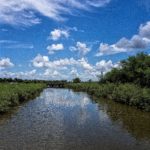EPA accepts Tres Palacios Creek watershed protection plan
Contact: Michael Schramm, 979- 458-9191, [email protected]
Dr. John Tracy, 979-862-7221, [email protected]
COLLEGE STATION — The U.S. Environmental Protection Agency has accepted the Tres Palacios Creek Watershed Protection Plan developed by the Texas Water Resources Institute, or TWRI, that will address excessive bacteria and depressed dissolved oxygen levels in the watershed.
The TWRI is part of AgriLife Research, the Texas A&M AgriLife Extension Service and the College of Agriculture and Life Sciences at Texas A&M University.
Developers said the plan meets the EPA’s national guidelines for watershed-based plans and outlines a strategy to improve the watershed.
“Voluntary efforts by local landowners, business representatives, soil and water conservation districts, city and county personnel and many more stakeholders collaborated to develop this plan,” said Michael Schramm, an institute research associate in College Station. “Without active participation from community members in planning sessions and meetings, this plan never would have materialized.”
He said the plan demonstrates how voluntary actions and collaboration between watershed stakeholders will mitigate pollutant sources in a way that is compatible with the goals of local businesses and landowners.
Part of the Matagorda Bay system, the Tres Palacios Creek Watershed covers 268 square miles in Matagorda and Wharton counties and empties into the Tres Palacios Bay.
“We are pleased with EPA’s acceptance of the plan,” said Dr. John Tracy, TWRI director, College Station. “The plan sets forth an approach to improve resource stewardship that allows stakeholders to rely on watershed resources for their livelihood while also helping to restore the quality of its water.”
Download the watershed plan (PDF). For more information about the project, visit the Tres Palacios page.
Development of the plan was funded through a state nonpoint source grant to TWRI from the Texas State Soil and Water Conservation Board.



